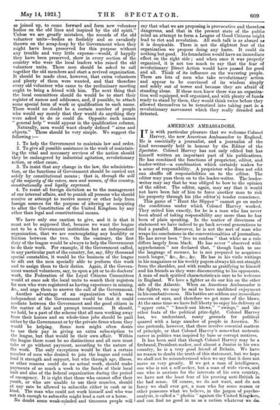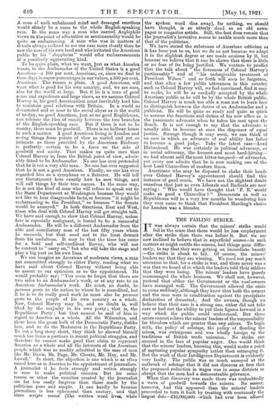AMERICAN AMBASSADORS.
IT is with particular pleasure that we welcome Colonel Harvey, the new American Ambassador to England. He is essentially a journalist, and a journalist of the kind necessarily held in honour by the Editor of the Spectator. Colonel Harvey has not only edited but has himself written an important part of his publications. He has combined the functions of proprietor, editor, and leader-writer—a combination which certainly makes for a sense of responsibility. A proprietor who does not edit leader-writer—a combination which certainly makes for a sense of responsibility. A proprietor who does not edit can shuffle off responsibilities on to the editor. The editor may pass them on to the leader-writer. The leader- writer may say that he was obliged to bow to the opinion of the editor. The editor, again, may say that it would not have been fair of him to force another man to risk his property through his (the editor's) tender conscience. This game of " Hunt the Slipper " cannot go on under the conditions under which Colonel Harvey worked. They suited him exactly, for he is a man who has never been afraid of taking responsibility any more than he has been of plain speaking. In the matter of directness of statement we have indeed to go back several generations to find a parallel. Moreover, he is not the sort of man who wraps his conclusions in the conventionalities of journalism. He has never been " free to confess " that white as a rule differs largely from black. He has never " observed with apprehension " nor declared that, " though loath to use the language of menace, he is not prepared to acquiesce much longer," &c., &c., &c. He has in his virile writings in his magazines or his weekly papers always hit out straight from the shoulder, and with results as gratifying to himself and his friends as they were disconcerting to his opponents. A man of such spirited characteristics is sure to be welcome in England. We love a fighter as do our kin on the other side of the Atlantic. When an American Ambassador is the fighter, we may be said to have undiluted enjoyment in his combativeness. His battles are seldom any immediate concern of ours, and therefore we get none of the blows. At the same time we have full liberty to enjoy his delivery of " upper cuts," " knock-out blows," " swings," and the other feats of the political prize-fight. Colonel Harvey has, we understand, many grounds for political quarrel with a large number of people in America. No one pretends, however, that these involve essential matters of principle, or that Colonel Harvey's somewhat meteoric career in politics was.inspired by base or corrupt motives. It has been said that though Colonel Harvey may be a firebrand, President-maker, and almost a Junius in his own country, he is a very good friend of Britain. We have no reason to doubt the truth of this statement, but we hope we shall not be misunderstood when we say that it does not move us very greatly. If we get a man of intelligence, one who is not a self-seeker, but a man of wide views, and one who is anxious for the interests of his own country, we have not the least fear of his proving anti-British in the bad sense. Of course, we do not want, and do not fancy we shall ever get, a man who for some reason or other possesses what we believe, in the jargon of psycho- analysis, is called a " phobia " against the United Kingdom, and can find no good in us as a nation whatever we do. A man of such unbalanced mind and deranged emotions would clearly be a curse to the whole English-speaking race. In the same way a man who carried Anglophile views to the point of affectation or sentimentality would be quite as embarrassing. A man who was in matters of details always inclined to see our case more clearly than he saw the case of his own land and who irritated the American public by his " sloppiness " would offer embarrassments of a peculiarly aggravating kind. To be quite plain, what we want, just as what America wants, in the Ambassador of the United States is a good American—a 100 per cent. American, or, since we deal in these days in super-percentages in our values, a 500 per cent. American. The reason is plain. A good American will want what is good for his own country, and, we are sure, also for the world at large. But if he is a man of good sense and experience and large views, as we assume Colonel Harvey is, his good Americanism must inevitably lead him to mamtain good relations with Britain. In a world so devastated and so near to the social abyss as is the world of to-day, no good American, just as. no good Englishman, can tolerate the idea of enmity between the two branches of the English-speaking race. But if there is not to be enmity, there must be goodwill. There is no halfway house in such a matter. A good American living in London and seeing things from points of view so varied and yet so intimate as those provided by the American Embassy is perfectly certain to be a force on the side of goodwill and amity. That makes us quite sure that Colonel Harvey is, from the British point of view, admir- ably fitted to be Ambassador. No one has ever pretended that he is not a very able man. No one has ever suggested that he is not a good American. Finally, no one has ever regarded him as a sycophant or a flatterer. He will tell our Government here exactly how he sees things, and will call things by their true names. In the same way, he is not the kind of man who will refuse to speak out to the State Department at Washington because they would not like to hear disagreeable facts, or because "it might be embarrassing to the President," or because " the Senate would be annoyed." In both directions, East and West, those who deal with Colonel Harvey will get straight talk. We have said enough to show that Colonel Harvey, unless fate is especially malignant, is bound to be a successful Ambassador. He will be a different Ambassador from the able and conciliatory men of the last fifty years whom he succeeds, but that need not in the least detract from his usefulness. It may be that the time has come for a bold and self-confident Envoy, who will not be content to " carry on," but who will take the stage and play a big part on his own lines.
We can imagine an American of moderate views, a man not committed strongly to either Party, reading what we have said about Colonel Harvey without being able to assent to our optimism as to the appointment. He would probably say: " You seem to forget that there are two sides to an Ambassador's work, or at any rate to an American Ambassador's work. He must, no doubt, be persona grata to the nation to whom he is accredited, but if he is to do really good work he must also be persona grata to the people of his own country as a whole. Now, Colonel Harvey may be, and no doubt is, well liked by the majority in his own party ; that is, the Republican Party ; but that cannot be said of him in regard to America as a whole. All the Wilsonites, and these form the great bulk of the Democratic Party, dislike him, and so do the Moderates in the Republican Party. To cut a long story short, they think he showed himself much too fierce a partisan in recent political struggles, and therefore he cannot make good that claim to represent America as a whole and all the interests of the American people which was so readily admitted in the ease of men like Mr. Davis, Mr. Page, Mr. Choate, Mr. Hay, and Mr. Lowell." In short, the objection is one which is as often raised here as in America to the appointment of journalists. A journalist if he feels strongly and writes strongly is sure to make political enemies. But for some reason or other the enmities created by the journalist are far less easily forgiven than those made by the politician pure and simple. It can hardly be because journalism is less ephemeral than oratory, and that lifers seripta manet (The written word lives, while the spoken word dies away), for nothing, we should have thought, is so utterly dead as an old news- paper or magazine article. Still, the fact does remain that the journalist's invective seems to rankle much more than that of the politician.
We have stated the substance of American criticism as it has been put to us, but we do so not because we adopt it in the slightest degree or are made anxious by it, but because we believe that it can be shown that there is little or no fear of its being justified. We venture to predict that the talk about ' the fierceness of Colonel Harvey's partisanship " and of " his unforgivable treatment of President Wilson" and so forth will soon be forgotten, and that after a few public utterances in this country such as Colonel Harvey will, we feel convinced, find it easy to make, he will be as cordially accepted by the whole American public as he will be by the whole British public. Colonel Harvey is much too able a man not to learn how to distinguish between the duties of an Ambassador and a publicist. He will be quite as ready and quite as quick to assume the functions and duties of his new office as is the passionate advocate when he takes his seat upon the Bench. It is not enough to say that the advocate is usually able to become at once the dispenser of equal justice.. Strange though it may seem, we can think of no case in which an advocate of real ability has failed to become a good judge. Take the latest case—Lord Birkenhead. He was certainly in political advocacy, as in social advocacy, the keenest and most hard-hitting— we had almost said the most bitter-tongued--of advocates, yet every one admits that he is now making one of the best Lord Chancellors of modern times.
Americans who may be disposed to shake their heads over Colonel Harvey's appointment should find this instance of good omen. We have not the slightest doubt ourselves that just as even Liberals and Radicals are now saying : " Who would have thought that ' F. E.' would make so good a Chancellor ? " Democrats as well as Republicans will in a very few months be wondering how they ever came to think that President Harding's choice for London was a blunder.



































 Previous page
Previous page